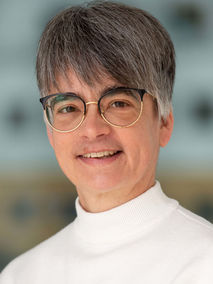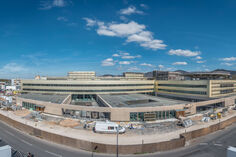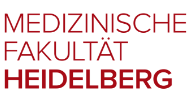
Prof. Dr. rer. nat. Susanne Dihlmann
Wiss. Mitarbeiterin
(Klinik für Gefäßchirurgie und Endovaskuläre Chirurgie)
Leitung Forschungslabor
Ärztlicher / Beruflicher Werdegang
- 2016
Verleihung der außerplanmäßigen Professur
- 2012
Master of Science in International Health (MScIH)
- 2008 – 2012
Berufsbegleitendes Postgraduierten-Studium International Health an verschiedenen Universitäten in Europa, TropEd Network of European institutions for higher education in international health
- 2006
Habilitation und Erteilung der venia legendi an der Ruprecht-Karls Universität Heidelberg, Thema: „Der Wnt-Signaltransduktionsweg als molekulares Ziel neuer Krebstherapien
- 1996
Promotion zum Dr. rer. nat. an der Ruprecht-Karls Universität Heidelberg
Thema: „Funktionelle Eigenschaften des Tumorsuppressorproteins APC“
- 1992
Diplomarbeit am European Molecular Biology Laboratory (EMBL) Heidelberg
- 1985 – 1992
Studium der Biologie an der Eberhand-Karls-Universität Tübingen, Abschluss Diplom
Wissenschaftlicher Werdegang
- seit 2011
Leitende Wissenschaftlerin; Klinik für Gefäßchirurgie und endovaskuläre Chirurgie, Universitätsklinik Heidelberg
- 2008 – 2010
Leiterin einer unabhängigen Forschungsgruppe, Pathologisches Institut; Universitätsklinik Heidelberg
- seit 2006
Privatdozentin an der Ruprecht-Karls Universität Heidelberg
- 2001 – 2008
Leitende Wissenschaftlerin; Abteilung Angewandte Tumorbiologie; Pathologisches Institut; Universitätsklinik Heidelberg
- 1997 – 2001
Postdoktorat, Chirurgische Universitätsklinik Heidelberg, Sektion für molekulare Diagnostik und Therapie
- 1992 – 1996
Wissenschaftliche Mitarbeiterin am DKFZ Heidelberg
Publikationen
- Tavris BS, Peters AS, Böckler D, and Dihlmann S. Mitochondrial dysfunction and increased DNA damage in vascular smooth muscle cells of abdominal aortic aneurysm (AAA-SMC). Oxid Med Cell Longev. 2023 Jan 25. Article ID 6237960 https://doi.org/10.1155/2023/6237960.
- Erhart P, Körfer D, Dihlmann S, Qiao JL, Hausser I, Ringleb P, Männer J, Dikow N, Schaaf CP, Grond-Ginsbach C, Böckler D. Multiple Arterial Dissections and Connective Tissue Abnormalities. J Clin Med. 2022 Jun 7;11(12):3264.
- Behrens AL, Dihlmann S, Grond-Ginsbach C, Peters AS, Dorweiler B, Böckler D, Erhart P. Gene Expression Profiling in Abdominal Aortic Aneurysms. J Clin Med. 2022 Jun 7;11(12):3260
- Wortmann M, Arshad M, Peters AS, Hakimi M, Böckler D, Dihlmann S. The C57Bl/6J mouse strain is more susceptible to angiotensin II-induced aortic aneurysm formation than C57Bl/6N. Atherosclerosis. 2021 Feb;318:8-13.
- Wortmann M, Arshad M, Hakimi M, Böckler D, Dihlmann S. Deficiency in Aim2 affects viability and calcification of vascular smooth muscle cells from murine aortas and angiotensin-II induced aortic aneurysms. Mol Med. 2020 Sep 15;26(1):87.
- Erhart P, Cakmak S, Grond-Ginsbach C, Hakimi M, Böckler D, Dihlmann S. Inflammasome activity in leucocytes decreases with abdominal aortic aneurysm progression. Int J Mol Med. 2019 Oct;44(4):1299-1308.
- Wortmann M, Skorubskaya E, Peters AS, Hakimi M, Böckler D, Dihlmann S. Necrotic cell debris induces a NF-κB-driven inflammasome response in vascular smooth muscle cells derived from abdominal aortic aneurysms (AAA-SMC). Biochem Biophys Res Commun. 2019 Apr 2;511(2):343-349.
- Wortmann M, Xiao X, Wabnitz G, Samstag Y, Hakimi M, Böckler D, Dihlmann S. AIM2 levels and DNA-triggered inflammasome response are increased in peripheral leukocytes of patients with abdominal aortic aneurysm. Inflamm Res. 2019 Apr;68(4):337-345.
- Erhart P, Schiele S, Ginsbach P, Grond-Ginsbach C, Hakimi M, Böckler D, Lorenzo-Bermejo J, Dihlmann S. Gene Expression Profiling in Abdominal Aortic Aneurysms After Finite Element Rupture Risk Assessment. J Endovasc Ther. 2017 Dec;24(6):861-869. Erratum in: J Endovasc Ther. 2018 Jun;25(3):408-409.
- Peters AS, Lercher M, Fleming TH, Nawroth PP, Bischoff MS, Dihlmann S, Böckler D, Hakimi M. Reduced glyoxalase 1 activity in carotid artery plaques of nondiabetic patients with increased hemoglobin A1c level. J Vasc Surg. 2016 Oct;64(4):990-4.
- Wu X, Cakmak S, Wortmann M, Hakimi M, Zhang J, Böckler D, Dihlmann S. Sex- and disease-specific inflammasome signatures in circulating blood leukocytes of patients with abdominal aortic aneurysm. Mol Med. 2016 Oct;22:505-518.
- Wortmann M, Hakimi M, Fleming T, Peters AS, Sijmonsma TP, Herzig S, Nawroth PP, Böckler D, Dihlmann S. A Glyoxalase-1 Knockdown Does Not Have Major Short Term Effects on Energy Expenditure and Atherosclerosis in Mice. J Diabetes Res. 2016;2016:2981639.
- Wu X, Hakimi M, Wortmann M, Zhang J, Böckler D, Dihlmann S. Gene expression of inflammasome components in peripheral blood mononuclear cells (PBMC) of vascular patients increases with age. Immun Ageing. 2015 Oct 6;12:15.
- Peters AS, Hakimi M, Vittas S, Fleming TH, Nawroth PP, Böckler D, Dihlmann S. Gender difference in glyoxalase 1 activity of atherosclerotic carotid artery lesions. J Vasc Surg. 2015 Aug;62(2):471-6.
- Kurz C, Hakimi M, Kloor M, Grond-Ginsbach C, Gross-Weissmann ML, Böckler D, von Knebel Doeberitz M, Dihlmann S. Coding Microsatellite Frameshift Mutations Accumulate in Atherosclerotic Carotid Artery Lesions: Evaluation of 26 Cases and Literature Review. Mol Med. 2015 Jun 9;21:479-86.
- Dihlmann S, Tao S, Echterdiek F, Herpel E, Jansen L, Chang-Claude J, Brenner H, Hoffmeister M, Kloor M. Lack of Absent in Melanoma 2 (AIM2) expression in tumor cells is closely associated with poor survival in colorectal cancer patients. Int J Cancer. 2014 Nov 15;135(10):2387-96.
- Erhart P, Grond-Ginsbach C, Hakimi M, Lasitschka F, Dihlmann S, Böckler D, Hyhlik-Dürr A. Finite element analysis of abdominal aortic aneurysms: predicted rupture risk correlates with aortic wall histology in individual patients. J Endovasc Ther. 2014 Aug;21(4):556-64.
- Dihlmann S, Erhart P, Mehrabi A, Nickkholgh A, Lasitschka F, Böckler D, Hakimi M. Increased expression and activation of absent in melanoma 2 inflammasome components in lymphocytic infiltrates of abdominal aortic aneurysms. Mol Med. 2014 Jun 19;20:230-7.
- Hakimi M, Peters A, Becker A, Böckler D, Dihlmann S. Inflammation-related induction of absent in melanoma 2 (AIM2) in vascular cells and atherosclerotic lesions suggests a role in vascular pathogenesis. J Vasc Surg. 2014 Mar;59(3):794-803.
Übersichtsartikel
- Wortmann M, Klotz R, Kalkum E, Dihlmann S, Böckler D, Peters AS. Inflammasome Targeted Therapy as Novel Treatment Option for Aortic Aneurysms and Dissections: A Systematic Review of the Preclinical Evidence. Front Cardiovasc Med. 2022 Jan 20;8:805150
- Dihlmann S, Peters AS, Böckler D. [Age-related dysfunction of mitochondria—Cause and therapeutic target of cardiovascular diseases]. Gefäßchirurgie 2022 April; 27(4): 1-8. German.
- Wortmann M, Peters AS, Erhart P, Körfer D, Böckler D, Dihlmann S. Inflammasomes in the Pathophysiology of Aortic Disease. Cells. 2021 Sep 15;10(9):2433.
- Dihlmann S, Peters AS, Hakimi M. [Development of arteriosclerosis]. Pathologe. 2019 Sep;40(5):559-572. German
- Wortmann M, Peters AS, Hakimi M, Böckler D, Dihlmann S. Glyoxalase I (Glo1) and its metabolites in vascular disease. Biochem Soc Trans. 2014 Apr;42(2):528-33.
Forschungsschwerpunkte
Forschungsschwerpunkte
- Pathophysiologie des abdominellen Aortenaneurysmas (AAA)
- Oxidativer Stress und mitochondriale Dysfunktion in Gefäßzellen
- AIM2-Inflammasomaktivität in Gefäßzellen und infiltrierenden Leukozyten
- Wirkungsweise therapeutischer Substanzen in Gefäßzellen
- Diagnostische und prognostische Biomarker für das AAA
Die Forschungsgruppe von Prof. Dr. S. Dihlmann befasst sich mit der Biologie der Blutgefäße, insbesondere mit der Rolle der vaskulären glatten Muskelzellen und ihrer Interaktion mit Zellen des Immunsystems im Verlauf von Aortenerkrankungen. Ausgehend von früheren Forschungen im Bereich der Tumorbiologie hat S. Dihlmann ihre Expertise zur Inflammasom-Aktivierung und der zellulären Signalwege auf die Untersuchung von Gefäßerkrankungen, insbesondere der Pathophysiologie des Aortenaneurysmas, übertragen.
Ihre derzeitigen Projekte umfassen zum einen Grundlagenforschung zur Funktion von Mitochondrien in glatten Gefäßmuskelzellen von Patienten mit Aortenerkrankungen. Ein weiteres Projekt befasst sich mit der Frage nach der Rolle der angeborenen Immunantwort als Trigger der chronischen Inflammation im abdominellen Aortenaneurysma (AAA). Hier wird insbesondere die Rolle des zytoplasmatischen DNA-Sensors und Inflammasomaktivators Absent in Melanoma 2 (AIM2) und dessen Beitrag zur chronischen Inflammation im AAA erforscht. Schließlich werden translationale Projekte wie die Suche nach zirkulierenden Biomarkern, mit deren Hilfe die Progression des abdominellen Aortenaneurysmas anhand von Blutanalysen überwacht werden kann, bearbeitet.
Main areas of research
- Pathophysiology of abdominal aortic aneurysm (AAA)
- Oxidative stress and mitochondrial dysfunction in vascular cells
- AIM2-Inflammasome activity in vascular cells and infiltrating leucocytes
- Mode of action of therapeutic substances in vascular cells
- Diagnostic and prognostic biomarkers for AAA
The research group of Prof. Dr. S. Dihlmann focuses on the biology of blood vessels, in particular the role of vascular smooth muscle cells and their interaction with cells of the immune system in the course of aortic diseases. Based on previous research in tumour biology, S. Dihlmann has shifted her expertise in inflammasome activation and cellular signalling pathways to the study of vascular diseases, in particular the pathophysiology of aortic aneurysm.
Her current projects include basic research on mitochondrial function in vascular smooth muscle cells from patients with aortic disease. Another project addresses the role of the innate immune response as a trigger of chronic inflammation in abdominal aortic aneurysm (AAA). In particular, the role of the cytoplasmic DNA sensor and inflammasome activator Absent in Melanoma 2 (AIM2) and its contribution to chronic inflammation in AAA is explored here. Finally, translational projects such as the search for circulating biomarkers that can be used to monitor the progression of abdominal aortic aneurysm based on blood analyses are part of her studies



